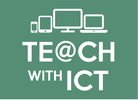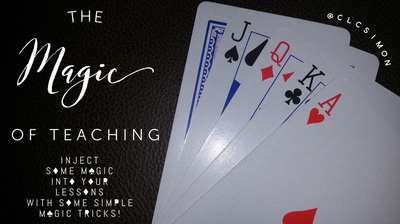The magic of ... Teaching
|
Some time ago I wrote an article in which I explored the use of magic tricks to support the teaching of computational thinking. Since then, I’ve begun to explore how magic tricks could be used in other subjects – not just Computing. In this article I explore why magic tricks are a powerful teaching tool and, with the aid of some examples, demonstrate how to use magic to support the teaching of subjects such as mathematics, literacy, computing and science.
|
Using magic as a teaching tool
Magic can be a powerful teaching tool. Not only will it have your students on the edge of their seats, it will also have your students excited and ready to learn. However, as well as being a hook to engage students, magic tricks can also help students understand abstract concepts used in maths and science and can be a great tool to engage reluctant writers.
Examples by subject
The magic of ... Computing
The magic of ... Maths
The magic of ... Literacy
The magic of ... Science
How to get started
The good news is that you don’t have to be a professional magician to perform these tricks – nor do you need to join the magic circle! Thankfully, there are a number of websites that will show you how to perform these simple tricks as well as show you how to incorporate these tricks into your lesson plans.
Below is a collection of websites dedicated to the use of magic in the classroom:
The magic of…
The magic of series is a collection of resources, produced by Queen Mary University of London, which aims to support teachers in the use of magic in the classroom to engage and inspire learners. All the resources are linked to the national curriculum and cover principles found in subjects such as Mathematics and Computing. Each resource contains a selection of hand-picked magic tricks and includes step-by-step instructions as well as explanations of how the tricks work.
Websites:
Maths Made Magic
A handbook of mathematical based magical tricks intended for use in the classroom. These magic tricks have been mapped to the KS4 curriculum and cover a diverse range of mathematical concepts from probability to Pythagoras. The handbook also contains step-by-step instructions for performing each trick as well as details of the mathematical principle behind the trick.
Website: https://www.qmul.ac.uk/mathsmagic/
The manual of mathematical magic
As well as showing you how to perform a variety of mathematical magical tricks, the book explores the mathematics behind each trick and explains how that same mathematics is used in the real world. It also looks at the varied and exciting sorts of jobs that make use of the mathematics powering your magic. All the tricks are self-working, which means there is no need to know any clever sleight of hand, and cover a range of mathematical concepts from addition to algebra.
Website: https://mathematicalmagic.com/
Illusioneering
A book containing easy to do magic tricks based on scientific principles covering chemistry, physics, engineering and mathematics. Each trick includes step-by-step instructions as well as tips for performing the trick.
Website: https://illusioneering.org/
Want more?
Here are some more sites to help you get started:
The good news is that you don’t have to be a professional magician to perform these tricks – nor do you need to join the magic circle! Thankfully, there are a number of websites that will show you how to perform these simple tricks as well as show you how to incorporate these tricks into your lesson plans.
Below is a collection of websites dedicated to the use of magic in the classroom:
The magic of…
The magic of series is a collection of resources, produced by Queen Mary University of London, which aims to support teachers in the use of magic in the classroom to engage and inspire learners. All the resources are linked to the national curriculum and cover principles found in subjects such as Mathematics and Computing. Each resource contains a selection of hand-picked magic tricks and includes step-by-step instructions as well as explanations of how the tricks work.
Websites:
- The magic of Computing: https://www.cs4fn.org/magic/
- The magic of Mathematics: https://www.qmul.ac.uk/mathsmagic/
Maths Made Magic
A handbook of mathematical based magical tricks intended for use in the classroom. These magic tricks have been mapped to the KS4 curriculum and cover a diverse range of mathematical concepts from probability to Pythagoras. The handbook also contains step-by-step instructions for performing each trick as well as details of the mathematical principle behind the trick.
Website: https://www.qmul.ac.uk/mathsmagic/
The manual of mathematical magic
As well as showing you how to perform a variety of mathematical magical tricks, the book explores the mathematics behind each trick and explains how that same mathematics is used in the real world. It also looks at the varied and exciting sorts of jobs that make use of the mathematics powering your magic. All the tricks are self-working, which means there is no need to know any clever sleight of hand, and cover a range of mathematical concepts from addition to algebra.
Website: https://mathematicalmagic.com/
Illusioneering
A book containing easy to do magic tricks based on scientific principles covering chemistry, physics, engineering and mathematics. Each trick includes step-by-step instructions as well as tips for performing the trick.
Website: https://illusioneering.org/
Want more?
Here are some more sites to help you get started:
- Hocus Focus: Magic tricks to support children with special needs.
- Teach by Magic: Magic tricks designed specifically for teachers.
- Magic Perspectives: A collection of magic tricks to use in the classroom.
- Shizzle Dizzle Magic: Magic tricks for teachers to use in their classroom.
- https://magic.about.com/od/science-magic-tricks/a/Teaching-Science-With-Magic.htm

